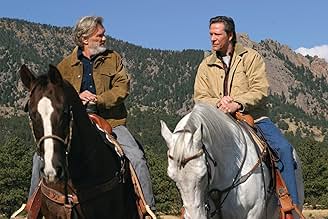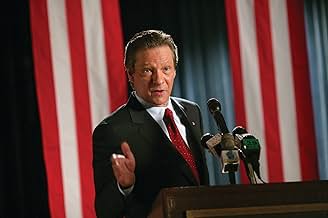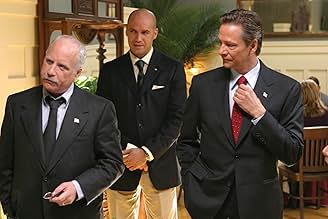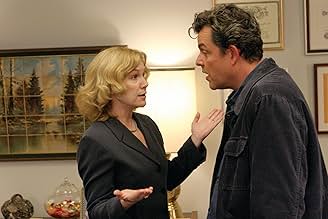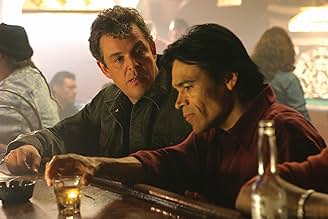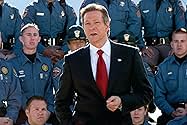AVALIAÇÃO DA IMDb
6,0/10
4,3 mil
SUA AVALIAÇÃO
Adicionar um enredo no seu idiomaThe discovery of a corpse threatens to unravel a bumbling local politician's campaign for governor of Colorado.The discovery of a corpse threatens to unravel a bumbling local politician's campaign for governor of Colorado.The discovery of a corpse threatens to unravel a bumbling local politician's campaign for governor of Colorado.
- Direção
- Roteirista
- Artistas
- Prêmios
- 1 vitória e 1 indicação no total
Avaliações em destaque
You'll never look at "W" again without thinking of Dickie Pilager! Nice piece of political satire and all too true. Well shot...well acted... and well directed. The characters are slightly "comic bookish" but consider their real life counterparts.
Be sure to look at the "Additional features" on the DVD. It contains some very pointed social commentary from some very concerned and talented individuals. This movie is probably more important now that we have had the election outcome of 2004.
The Haskell Wexler cinematography is really excellent. Be sure to notice the backgrounds when he is interviewed!
Be sure to look at the "Additional features" on the DVD. It contains some very pointed social commentary from some very concerned and talented individuals. This movie is probably more important now that we have had the election outcome of 2004.
The Haskell Wexler cinematography is really excellent. Be sure to notice the backgrounds when he is interviewed!
While not at the level of the best Sayles movies (Lone Star, The Secret of Roan Inish, etc.), Silver City is still entertaining. The film suffers a bit from trying to do too much, and not quite making it all the way to any of its targets. But there's still a lot to enjoy.
My first thought while watching this movie was: hey, Chris Cooper isn't the star! Since his face is featured on the poster, and he starred in Lone Star, and is generally considered an A List actor these days, this was a bit of a surprise. The lead actor turned out to be Danny Huston, half-brother of Angelica, son of John, grandson of Walter, etc. Huston's character, Danny O'Brien, is hired by the Pilager campaign to intimidate a few enemies of Dickie Pilager (Cooper) after a dead body shows up in a lake during a campaign photo op. But O'Brien is by nature anti-establishment, and instincts from his previous life as an investigative journalist kick in, so he starts to investigate much more than he was hired to.
The supporting cast is terrific, though many of them (Tim Roth and Thora Birch come to mind) are wasted in tiny roles. Aside from Huston and Cooper, the only actors given much to work with are Maria Bello as his ex-girlfriend, who also happens to be a political reporter, Richard Dreyfuss as the Rove-like campaign manager, and Sal Lopez as a Mexican chef that O'Brien gets involved in investigating the background of the victim. Daryl Hannah has a nice small role as Maddy Pilager, the candidate's sister.
The general problem the movie has is that it seems a bit indecisive as to whether it's about immigration or about politics. It seems to be a bit more about immigration than politics, and other films such as Redford's "The Candidate" have covered the latter ground with considerably more energy and insight. Some reviewers have noted a parallel to the Huston masterpiece "Chinatown" - but that's a high standard to aim for, and Silver City really doesn't come close. The script is far too disjointed, and Danny Huston is just not close to Nicholson's level as an actor. Still, the movie is enjoyable, especially for its insights into the migrant worker community, which is usually ignored by most Americans.
My first thought while watching this movie was: hey, Chris Cooper isn't the star! Since his face is featured on the poster, and he starred in Lone Star, and is generally considered an A List actor these days, this was a bit of a surprise. The lead actor turned out to be Danny Huston, half-brother of Angelica, son of John, grandson of Walter, etc. Huston's character, Danny O'Brien, is hired by the Pilager campaign to intimidate a few enemies of Dickie Pilager (Cooper) after a dead body shows up in a lake during a campaign photo op. But O'Brien is by nature anti-establishment, and instincts from his previous life as an investigative journalist kick in, so he starts to investigate much more than he was hired to.
The supporting cast is terrific, though many of them (Tim Roth and Thora Birch come to mind) are wasted in tiny roles. Aside from Huston and Cooper, the only actors given much to work with are Maria Bello as his ex-girlfriend, who also happens to be a political reporter, Richard Dreyfuss as the Rove-like campaign manager, and Sal Lopez as a Mexican chef that O'Brien gets involved in investigating the background of the victim. Daryl Hannah has a nice small role as Maddy Pilager, the candidate's sister.
The general problem the movie has is that it seems a bit indecisive as to whether it's about immigration or about politics. It seems to be a bit more about immigration than politics, and other films such as Redford's "The Candidate" have covered the latter ground with considerably more energy and insight. Some reviewers have noted a parallel to the Huston masterpiece "Chinatown" - but that's a high standard to aim for, and Silver City really doesn't come close. The script is far too disjointed, and Danny Huston is just not close to Nicholson's level as an actor. Still, the movie is enjoyable, especially for its insights into the migrant worker community, which is usually ignored by most Americans.
Limp satire misses almost every mark. The target appears to be Bush, but none of Bush's real weaknesses are underscored with any satiric edge - speeches by Bush himself are funnier than those delivered by Candidate Pillager. In fact the script can't decide whether it's a real satire or a dramatic comment on political problems faced by illegal aliens. At any rate, the pacing of the comic moments is pretty bad - there's no oomph here, no energy. The acting also lacks energy - it is clear the actors aren't sure what Sayles wants from them - a matter made worse by the fact that every character is embarrassingly miscast.
This film is a shocking disappointment for admirers of Sayles' previous exceptionally fine work. What the heck went wrong here? And now I see Sayles is slated to do a "Juraissic Park" sequel? Obviously something's gone bad for this man's career - I hope he can pull it back together. But not with a film this incomplete.
This film is a shocking disappointment for admirers of Sayles' previous exceptionally fine work. What the heck went wrong here? And now I see Sayles is slated to do a "Juraissic Park" sequel? Obviously something's gone bad for this man's career - I hope he can pull it back together. But not with a film this incomplete.
I was disappointed by this. Oh, it is great fun goofing on any politician, the more smarmy and sanctimonious the better. But I can get political goofs by the dump truck load from elsewhere. What I expected was something as gently incisive as, say, "Doonesbury," but with the cinematic skills we know Sayles has. Something as gentle and sharp as "tanner on Tanner."
We have three threads here. The first is the depiction of the system, the handlers and supporters that "make" a president. We all know how it is; many politicians admit it and nearly all journalists report on it. There isn't a shred of newness in this thread, and surely not out of Dreyfuss.
There's a second component having to do with the story that wraps the thing. Now here is where I expected some art. What we end up with a single big corporation as the bad guy, no, beyond that a single corporate man. Then we see how his misdeeds unravel a bit. Sure, we have payoffs, bribery, rampant disregard for the environment and a cover-up.
But see. The thing to make fun of is how some reduce big complex issues to simple narratives. How they take a million threads of a complex tapestry with inscrutable hues and patterns and reduce it to a paper towel with flag patterns. So why do the same thing when satirizing them? Why? It isn't as if there aren't people in the film world incapable of doing this? Or was it just a rush job?
Most people let all that slip because Chris Cooper's version is too delicious. Here's the problem with this: its not disturbing enough. The thing with the target's speech is how he needs to have his mouth work, but his mind cannot produce the coherent thought fast enough, so it looks for stored phrases and tries to evaluate them for appropriateness on the fly. This gives both odd pauses and sometimes goofy leaps in concepts and metaphors.
Listen to Cooper and pay attention to the leaps. Both are fabricated for dramatic effect. The pauses are regular. They're not even, but they have multiples: pause, twice as long three times as long. And they have a rhythm that if you listen makes a sort of sense.
Now look at the linguistic leaps. They have the same patterns, regular semantic distances. That's because we as viewers have to be in on the joke. We know he will jump and precisely how far. We just don't know the direction. See, humor is in the unexpected and in order for it to work, you need to set expectations.
Now, dear reader, listen to the target. He is not creating something as art, he is just living. What you will find is a well-studied artifact of a man whose cognitive centers have been damaged by cocaine saturation. There is no regularity. Pauses are random. The semantic distances are random. That's the whole point. This is what you find in substance abusers. Always. It is not dumbness but drug damage.
Oddly the National Institutes of Health had a great research program on this because all sorts of conditions like Alzheimers can be diagnosed by measuring these speech effects. But once the link was make to cocaine users, the program was terminated. Now that would make a good movie, Huh?
Ted's Evaluation -- 2 of 3: Has some interesting elements.
We have three threads here. The first is the depiction of the system, the handlers and supporters that "make" a president. We all know how it is; many politicians admit it and nearly all journalists report on it. There isn't a shred of newness in this thread, and surely not out of Dreyfuss.
There's a second component having to do with the story that wraps the thing. Now here is where I expected some art. What we end up with a single big corporation as the bad guy, no, beyond that a single corporate man. Then we see how his misdeeds unravel a bit. Sure, we have payoffs, bribery, rampant disregard for the environment and a cover-up.
But see. The thing to make fun of is how some reduce big complex issues to simple narratives. How they take a million threads of a complex tapestry with inscrutable hues and patterns and reduce it to a paper towel with flag patterns. So why do the same thing when satirizing them? Why? It isn't as if there aren't people in the film world incapable of doing this? Or was it just a rush job?
Most people let all that slip because Chris Cooper's version is too delicious. Here's the problem with this: its not disturbing enough. The thing with the target's speech is how he needs to have his mouth work, but his mind cannot produce the coherent thought fast enough, so it looks for stored phrases and tries to evaluate them for appropriateness on the fly. This gives both odd pauses and sometimes goofy leaps in concepts and metaphors.
Listen to Cooper and pay attention to the leaps. Both are fabricated for dramatic effect. The pauses are regular. They're not even, but they have multiples: pause, twice as long three times as long. And they have a rhythm that if you listen makes a sort of sense.
Now look at the linguistic leaps. They have the same patterns, regular semantic distances. That's because we as viewers have to be in on the joke. We know he will jump and precisely how far. We just don't know the direction. See, humor is in the unexpected and in order for it to work, you need to set expectations.
Now, dear reader, listen to the target. He is not creating something as art, he is just living. What you will find is a well-studied artifact of a man whose cognitive centers have been damaged by cocaine saturation. There is no regularity. Pauses are random. The semantic distances are random. That's the whole point. This is what you find in substance abusers. Always. It is not dumbness but drug damage.
Oddly the National Institutes of Health had a great research program on this because all sorts of conditions like Alzheimers can be diagnosed by measuring these speech effects. But once the link was make to cocaine users, the program was terminated. Now that would make a good movie, Huh?
Ted's Evaluation -- 2 of 3: Has some interesting elements.
John Sayles repeats himself in "Silver City," borrowing very heavy-handedly from his much more effective takes on local politics and the environment that spawns it, from his "City of Hope" (urban NJ), "Lone Star" (Texas)--which also featured Kris Kristofferson in a not dissimilar role-- and "Sunshine State" (Florida), though now he's taking on Colorado.
Other actors also seem to be present for their resonance from other features, Michael Murphy from "Tanner 88," Daryl Hannah almost as crazy as she was in "Kill Bill, Volume 2," and Richard Dreyfuss channeling Duddy Kravitz as a campaign manager.
While Chris Cooper is very effective in capturing a George W. Bush-type politician from a family dynasty, Danny Huston switches confusingly from cynical ex-journalist/investigator to naif as he uncovers a scandal with ever-widening yet encircling entanglements of class, ethnicity, media, real estate, wildlife, etc. etc.
While the satire is scarily amusing, the final scene of this overlong film is literally overkill.
Sayles as usual carefully picks the songs on the soundtrack, here there's frequent Cowboy Junkies tracks.
Other actors also seem to be present for their resonance from other features, Michael Murphy from "Tanner 88," Daryl Hannah almost as crazy as she was in "Kill Bill, Volume 2," and Richard Dreyfuss channeling Duddy Kravitz as a campaign manager.
While Chris Cooper is very effective in capturing a George W. Bush-type politician from a family dynasty, Danny Huston switches confusingly from cynical ex-journalist/investigator to naif as he uncovers a scandal with ever-widening yet encircling entanglements of class, ethnicity, media, real estate, wildlife, etc. etc.
While the satire is scarily amusing, the final scene of this overlong film is literally overkill.
Sayles as usual carefully picks the songs on the soundtrack, here there's frequent Cowboy Junkies tracks.
Você sabia?
- CuriosidadesThe Bentel company logo is a direct copy from Bechtel Corporation which is a real American defense contractor.
- Erros de gravaçãoWhen Danny is splashing in the mine, the type of flashlight he is holding changes several times.
- ConexõesReferenced in Tell Them Who You Are (2004)
- Trilhas sonorasMining for Gold
Written by Philip Thomas and James Gordon
Performed by Cowboy Junkies
Courtesy of BMG Music Canada Inc.
Under license from BMG Film & TV Music
Principais escolhas
Faça login para avaliar e ver a lista de recomendações personalizadas
- How long is Silver City?Fornecido pela Alexa
Detalhes
Bilheteria
- Orçamento
- US$ 5.000.000 (estimativa)
- Faturamento bruto nos EUA e Canadá
- US$ 1.020.656
- Fim de semana de estreia nos EUA e Canadá
- US$ 337.484
- 19 de set. de 2004
- Faturamento bruto mundial
- US$ 1.384.395
- Tempo de duração
- 2 h 8 min(128 min)
- Cor
- Mixagem de som
- Proporção
- 1.85 : 1
Contribua para esta página
Sugerir uma alteração ou adicionar conteúdo ausente



